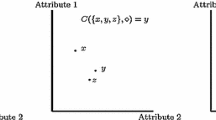Abstract
Extensive field and experimental evidence in a variety of environments show that behavior depends on a reference point. This paper provides an axiomatic characterization of this dependence. We proceed by imposing gradually more structure on both choice correspondences and preference relations, requiring increasingly higher levels of rationality, and freeing the decision-maker from certain types of inconsistencies. The appropriate degree of behavioral structure will depend on the phenomenon that is to be modeled. Last, we provide two applications of our work: one to model the status-quo bias, and another to model addictive behavior.
Similar content being viewed by others
References
Arrow K.: Rational choice functions and orderings. Economica 26, 121–127 (1959)
Bateman I., Munro A., Rhodes B., Starmer C., Sugden R.: A test of the theory of reference-dependent preferences. Q J Econ 112, 479–505 (1997)
Becker G., Murphy K.: A theory of rational addiction. J Polit Econ 96, 675700 (1988)
Bleichrodt, H.: (2006) Prospect theory with reference points in the opportunity set. Unpublished manuscript, Erasmus University
Bleichrodt H.: Reference-dependent utility with shifting reference points and incomplete preferences. J Math Psychol 51, 266–276 (2007)
Bossert, W., Sprumont, Y.: (2006) Non-deteriorating choice. Unpublished manuscript, Université de Montréal
Camerer C.: Individual decision making. In: Kagel, J., Roth, A.(eds) Handbook of Experimental Economics. Princeton University Press, Princeton (1995)
Camerer C., Issaharoff S., Loewenstein G., O’Donoghue T., Rabin M.: Regulation for conservatives: behavioral economics and the case for asymmetric paternalism. U Penn Law Rev 151, 1211–1254 (2003)
Campbell J.Y.: Asset prices, consumption, and the business cycle. In: Taylor, J.B., Woodford, M.(eds) Handbook of Macroeconomics, North-Holland, Amsterdam (1999)
Danan, E.: Money pumps for incomplete and discontinuous preferences. Unpublished manuscript, Universite de Cergy-Pontoise (2005)
Duesenberry J.: Income, Saving, and the Theory of Consumer Behavior. Harvard University Press, Cambridge (1949)
Elster J.: Addiction: Entries and Exits. Russell Sage Foundation, New York (1999)
Fishburn P.: Nonlinear Preference and Utility Theory. Johns Hopkins, Baltimore (1988)
Giraud, R.: (2004) Reference-dependent preferences: rationality, mechanism and welfare implications. Unpublished manuscript, Univeristy of Paris I
Giraud R.: Reference-dependent preferences: an axiomatic approach to the underlying cognitive process. In: Walliser, B., Topol, R. (eds) Cognitive Economics: New Trends. Elsevier, Amsterdam (2006)
Giraud, R.: Money matters: an axiomatic exploration of the endowment effect and the preference reversal phenomenon. Unpublished manuscript, University of Paris I (2007)
Herrnstein R.J., Prelec D.: A theory of addiction. In: Loewenstein, G.F., Elster, J.(eds) Choice over Time. Russell Sage Foundation, New York (1992)
Houthakker H.S.: Revealed preference and the utility function. Economica 17, 159–174 (1950)
Huck S., Kirchsteiger G., Oechssler J.: Learning to like what you have: explaining the endowment effect. Econ J 115, 689–702 (2005)
Kahneman D., Tversky A.: Prospect theory: an analysis of decision under risk. Econometrica 47, 263–291 (1979)
Kahneman D., Knetsch J., Thaler R.: Experimental tests of the endowment effect and the Coase theorem. J Polit Econ 98, 1325–1348 (1990)
Kahneman D., Knetsch J., Thaler R.: Anomalies: the endowment effect, loss aversion, and status quo bias. J Econ Perspect 5, 193–206 (1991)
Köszegi B., Rabin M.: A model of reference-dependent preferences. Q J Econ 121, 1133–1165 (2006)
Knetsch J.: The endowment effect and evidence of nonreversible indifference curves. Am Econ Rev 79, 1277–1284 (1989)
Knetsch J., Sinden J.: Willingness to pay and compensation demanded: experimental evidence of an unexpected disparity in measures of value. Q J Econ 99, 507–521 (1984)
Mandler M.: Incomplete preferences and rational intransitivity of choice. Game Econ Behav 50, 255–277 (2005)
Masatlioglu Y., Ok E.A.: Rational choice with status quo bias. J Econ Theory 121, 1–29 (2005)
Masatlioglu, Y., Ok, E.A.: Reference-dependent procedural decision making. Unpublished manuscript, NYU (2006)
Masatlioglu, Y., Uler, N.: Competing reference dependent models. Unpublished manuscript, University of Michigan (2005)
Mas-Colell A., Whinston M.D., Green J.R.: Microeconomic Theory. Oxford University Press, New York (1995)
Munro A., Sugden R.: On the theory of reference-dependent preferences. J Econ Behav Organ 50, 407–428 (2003)
Plott C.R.: Path independence, rationality, and social choice. Econometrica 41, 1075–1091 (1973)
Pollak R.A.: Habit formation and dynamic demand functions. J Polit Econ 78, 745–763 (1970)
Raiffa H.: Decision Analysis. Addison-Wesley, Reading (1968)
Rabin M.: Psychology and economics. J Econ Lit 36, 11–46 (1998)
Rubinstein A., Zhou L.: Choice problems with a reference point. Math Soc Sci 37, 205–209 (1999)
Ryder H., Heal G.: Optimal growth with intertemporally dependent preferences. Rev Econ Stud 40, 133 (1973)
Sagi J.: Anchored preference relations. J Econ Theory 130, 283–295 (2006)
Samuelson W., Zeckhauser R.: Status quo bias in decision making. J Risk Uncertainty 1, 7–59 (1988)
Sen A.: Quasi-transitivity, rational choice, and collective decisions. Rev Econ Stud 36, 381–393 (1969)
Sugden R.: Reference-dependent subjective expected utility. J Econ Theory 111, 172–191 (2003)
Thaler R.: Toward a positive theory of consumer behavior. J Econ Behav Organ 1, 39–60 (1980)
Tversky A., Kahneman D.: Loss aversion in riskless choice: a reference-dependent model. Q J Econ 106, 1039–1061 (1991)
Tversky A., Slovic P., Kahneman D.: The causes of preference reversal. Am Econ Rev 80, 204–217 (1990)
Zhou, L.: Revealed preferences and status quo effect. Unpublished manuscript, Duke University (1997)
Author information
Authors and Affiliations
Corresponding author
Additional information
We thank the participants of many seminars and conferences for their valuable comments. We are most grateful to a referee for many valuable comments, suggestions, and criticisms that have led to a substantial improvement in the manuscript. The research was sponsored by the Spanish Commission of Science and Technology (SEJ2006-11510 and SEJ2005-01481/ECON) and the Barcelona Economics Program of CREA.
Rights and permissions
About this article
Cite this article
Apesteguia, J., Ballester, M.A. A theory of reference-dependent behavior. Econ Theory 40, 427–455 (2009). https://doi.org/10.1007/s00199-008-0387-z
Received:
Accepted:
Published:
Issue Date:
DOI: https://doi.org/10.1007/s00199-008-0387-z
Keywords
- Individual rationality
- Reference-dependence
- Rationalization
- Path independence
- Status-quo bias
- Addiction
- Habit formation




